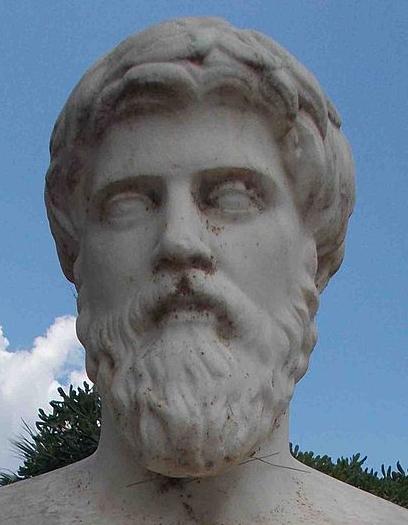Sin fuentes
Variante: No necesito amigos que cambien cuando yo cambio y asientan cuando yo asiento. Mi sombra lo hace mucho mejor.
Frases célebres de Plutarco
“El cerebro no es un vaso por llenar, sino una lámpara por encender.”
Sin fuentes
Variante: La mente no es un vaso para llenar, sino una lámpara para encender.
Frases de hombres de Plutarco
Frases de amistad de Plutarco
Plutarco Frases y Citas
“Quien tiene muchos vicios, tiene muchos amos.”
Fuente: Citado en Los Grandes Escritores: Vidas, obras y estilos de los más influyentes autores de la historia. Autor y editor Borja Loma Barrie, 2017.
Plutarco: Frases en inglés
“That proverbial saying, "Ill news goes quick and far."”
Of Inquisitiveness
Bartlett's Familiar Quotations, 10th ed. (1919)
“The general himself ought to be such a one as can at the same time see both forward and backward.”
Whether an Aged Man ought to meddle in State Affairs
Bartlett's Familiar Quotations, 10th ed. (1919)
Of Pausanias the Son of Phistoanax
Laconic Apophthegms
Life of Alexander
Bartlett's Familiar Quotations, 10th ed. (1919)
“Alexander was wont to say, "Were I not Alexander, I would be Diogenes."”
Of the Fortune or Virtue of Alexander the Great
Bartlett's Familiar Quotations, 10th ed. (1919)
Consolation to Apollonius
“It is a true proverb, that if you live with a lame man, you will learn a limp.”
Moralia, Of the Training of Children
62 Eudæmonidas
Apophthegms of Kings and Great Commanders
Life of Demosthenes
Bartlett's Familiar Quotations, 10th ed. (1919)
“Simonides calls painting silent poetry, and poetry speaking painting.”
Whether the Athenians were more Warlike or Learned, 3
Bartlett's Familiar Quotations, 10th ed. (1919)
Rules for the Preservation of Health, 7
Bartlett's Familiar Quotations, 10th ed. (1919)
“It is a difficult thing for a man to resist the natural necessity of mortal passions.”
Of those whom God is slow to punish
Bartlett's Familiar Quotations, 10th ed. (1919)
“Knowledge of divine things for the most part, as Heraclitus says, is lost to us by incredulity.”
Life of Coriolanus
Bartlett's Familiar Quotations, 10th ed. (1919)
“No man ever wetted clay and then left it, as if there would be bricks by chance and fortune.”
Of Fortune
Bartlett's Familiar Quotations, 10th ed. (1919)
55 Phocion
Apophthegms of Kings and Great Commanders
“An old doting fool, with one foot already in the grave.”
Moralia, Of the Training of Children
“There is no debt with so much prejudice put off as that of justice.”
Of those whom God is slow to punish
Bartlett's Familiar Quotations, 10th ed. (1919)
“Euripides was wont to say, "Silence is an answer to a wise man."”
Of Bashfulness
Bartlett's Familiar Quotations, 10th ed. (1919)
“He is a fool who leaves things close at hand to follow what is out of reach.”
Of Garrulity.
Attributed to Hesiod, Frag. 219
Moralia, Others
